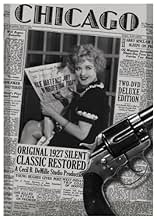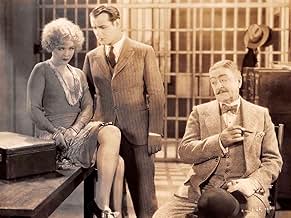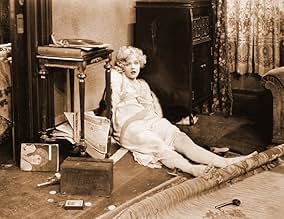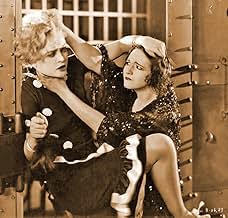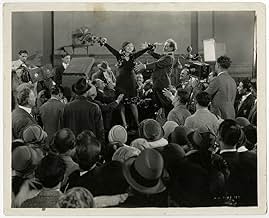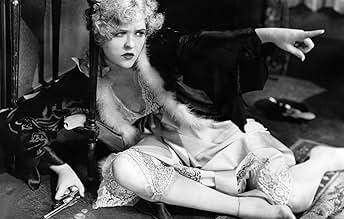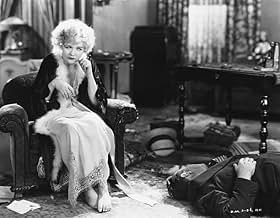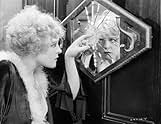A wild jazz-loving and boozing wife Roxie Hart kills her boyfriend in cold blood after he leaves her.A wild jazz-loving and boozing wife Roxie Hart kills her boyfriend in cold blood after he leaves her.A wild jazz-loving and boozing wife Roxie Hart kills her boyfriend in cold blood after he leaves her.
- Director
- Writers
- Stars
- Awards
- 2 wins total
Emily Barrye
- Woman in Cell Reading Book
- (uncredited)
Sidney Bracey
- Bill Collector
- (uncredited)
Robert Brower
- Juror
- (uncredited)
Sidney D'Albrook
- Photographer
- (uncredited)
Jack Dean
- Assistant Prosecutor
- (uncredited)
Robert Dudley
- Insurance Agent
- (uncredited)
Jim Farley
- Detective
- (uncredited)
- Director
- Writers
- All cast & crew
- Production, box office & more at IMDbPro
Featured reviews
10tybalt-2
Last night the Sam Goldwyn theatre at the Academy in Los Angeles was filled to capacity for the screening of this 1927 silent movie. The print was a restoration, by UCLA, of the original nitrate copy from the DeMille family's archives. It was a full length version, with a 10 min. intermission. Johnny Crawford's orchestra provided a live musical accompaniment, based on original scoring notes. A standing ovation at the end proves that a really well performed silent movie can stand the test of time. Phyllis Haver had a range of expressions from A to Z - fantastic - and the courtroom scene, played for comedy, was truly a highlight. If a DVD is made, as has been suggested, you're in for a treat.
"Those who forget History are condemned to repeat it" is the famous quote and perhaps that explains the current movie climate where remakes predominate. As we continue to evolve into a culture of short term gratification and long term memory loss, it's important to rediscover forgotten parts of our cinematic history especially when it's presented in such a way as this. David Shepard and Flicker Alley are to be congratulated yet again for their fine work in bringing to us another film previously thought to be lost.
For those of you not familiar with the award winning Broadway musical or 2002 film version, CHICAGO is based on a 1926 play which tells the story of the trial of Roxie Hart, an adulterous wife who shot her lover after he tried to ditch her. The play isn't about the verdict but how the trial is used to promote almost everyone involved except the long suffering husband. Although played for all its melodramatic possibilities with elements of humor, it sadly shows us that little has changed in 80 years when it comes to sensational journalism.
The film rights were quickly snapped up by Cecil B. De Mille who had his own movie company at this time. It's essentially his movie all the way but he allowed Frank Urson (an assistant director) to take credit because of De Mille's involvement with THE KING OF KINGS which was already in theaters. Phyllis Haver gives a wonderfully manic and comic performance as Roxie Hart while Victor Varconi excels as the betrayed husband, Amos Hart and yes that's gravelly voiced Eugene Pallette minus his voice and later girth as the murdered lover. The print looks as if it were processed yesterday and Rodney Sauer's score is up to his usual fine standards. With the usual Flicker Alley extras, CHICAGO is a must for silent film fans and is an ideal introduction to those who are not...For more reviews visit The Capsule Critic.
For those of you not familiar with the award winning Broadway musical or 2002 film version, CHICAGO is based on a 1926 play which tells the story of the trial of Roxie Hart, an adulterous wife who shot her lover after he tried to ditch her. The play isn't about the verdict but how the trial is used to promote almost everyone involved except the long suffering husband. Although played for all its melodramatic possibilities with elements of humor, it sadly shows us that little has changed in 80 years when it comes to sensational journalism.
The film rights were quickly snapped up by Cecil B. De Mille who had his own movie company at this time. It's essentially his movie all the way but he allowed Frank Urson (an assistant director) to take credit because of De Mille's involvement with THE KING OF KINGS which was already in theaters. Phyllis Haver gives a wonderfully manic and comic performance as Roxie Hart while Victor Varconi excels as the betrayed husband, Amos Hart and yes that's gravelly voiced Eugene Pallette minus his voice and later girth as the murdered lover. The print looks as if it were processed yesterday and Rodney Sauer's score is up to his usual fine standards. With the usual Flicker Alley extras, CHICAGO is a must for silent film fans and is an ideal introduction to those who are not...For more reviews visit The Capsule Critic.
I suspect that Mr. Rob Marshall watched this 1927 silent before making his recent screen adaptation of the smash-hit Broadway musical. The non-musical scenes in his version look an awful lot like this exceptional film.
Phyllis Haver provides a marvelously witty and sexy characterization as Roxie Hart, that ultimate gold digger who shoots her lover for jilting her and then becomes a media sensation. Haver puts all sorts of unique touches on the role, and her scenes during the murder trial are small gems of comic acting. The handsome Victor Varconi, looking for all the world like Liam Neeson, has a much larger role as Amos, Roxie's long-suffering husband, than any subsequent version would give that character. He's still a bit of a sap, but he's a much sharper sap than later incarnations would allow. This original version focuses much more on the domestic relationship between these two -- the roles of Billy Flynn and Mama Morton, treated so colorfully in the musical, are much diminished here, and the character of Velma Kelly is absent altogether.
The recent stage revival and movie have blunted the impact of this story's critique on the modern media and the public's responsibility in enabling our media to peddle trash. It's surprising that a film that came out nearly 80 years ago makes the same point just as candidly; one can only imagine how forceful this message must have seemed at the time.
Grade: A
Phyllis Haver provides a marvelously witty and sexy characterization as Roxie Hart, that ultimate gold digger who shoots her lover for jilting her and then becomes a media sensation. Haver puts all sorts of unique touches on the role, and her scenes during the murder trial are small gems of comic acting. The handsome Victor Varconi, looking for all the world like Liam Neeson, has a much larger role as Amos, Roxie's long-suffering husband, than any subsequent version would give that character. He's still a bit of a sap, but he's a much sharper sap than later incarnations would allow. This original version focuses much more on the domestic relationship between these two -- the roles of Billy Flynn and Mama Morton, treated so colorfully in the musical, are much diminished here, and the character of Velma Kelly is absent altogether.
The recent stage revival and movie have blunted the impact of this story's critique on the modern media and the public's responsibility in enabling our media to peddle trash. It's surprising that a film that came out nearly 80 years ago makes the same point just as candidly; one can only imagine how forceful this message must have seemed at the time.
Grade: A
Chicago in the mid 20's of the last century.
In this modern Amerikan city reside the Hart's, a young married couple, who adapt to the spirit of the big city. Herr Amos Hart works in a tobacco store and Frau Roxie Hart does absolute nothing but to be unfaithful to her husband with an old man. The old-timer accommodates her whims although this is coming nearly to an end. So when Frau Roxie hears this news; she, who is a bad, bad girl ( besides a peroxide blonde with no brains ... excuse this Herr Graf for such obvious remark ) kills her lover in her apartment.
Desperate over what she has done, she calls for help to her husband telling him that the old man tried to get advantage of her. Herr Hart who is a good man but not stupid at all, discovers what really happened in there. But his love for Roxie is so important to him that he decides to help her by taking the services of a famous, greedy and unscrupulous advocate ( excuse again this Herr Graf for such an obvious remark ); this in order to defend his wife from the death penalty. However, such favour has an expensive price – 5.000 grand that obviously Herr Hart doesn't have.
During a visit to his greedy advocate, he finds out where he hides a lot of money in his bureau and during the night steals the money ( an honourable deed indeed, to rob an advocate ). Meanwhile Frau Roxie Hart's famous trial is nearly begun.
"Chicago", a film directed by Herr Frank Urson in the silent year of 1927, was based in a Broadway play which in turn was based on a true story ( occurring in a real city! ). Reminiscences of the original stage play in its primal concept can be seen in the film, when the director uses a few sets ( the Hart's apartment, the jail or the trial court ) in order to develop the story as it were different acts of a play. This is especially during the first part of the film during the dramatic development at the Hart's apartment and at the end of the movie during the trial. However, Herr Urson makes fairly good use of the proper characteristics of the cinema film narrative in "Chicago" by, constructing excellent visual metaphors ( the jury's feet responding Frau Roxie charms, the tabloid paper going down the gutter ). There are also important and sibylline sexual remarks that are present during the whole film (ah, that garter bell belt). And let's not forget the social realism that can be seen in the film ( Chicago daily life or the Hart's apartment ). Especially outstanding is the power of the yellow press in those old days ( and unfortunately in these modern days too ); the sensationalist journals build up stories on innocent celebrities that certainly have few merits. Naturally this happened with the madcap Roxie, a situation depicted in "Chicago" in a raw and effective way.
Another merit of "Chicago" is the combination of comedy and drama in equal terms highlighting Frau Roxie's stupidity, selfishness and easy living in contrast with her self-sacrificing husband who suffers the acts and nonsense of his wife. He's a man who honestly cares about and loves his wife enough to steal and lie for her although this affection and emotion is not returned.
Starring as the couple are two excellent and not well-known actors who handle their roles considerably well. Herr Victor Varconi as Herr Amos Hart is the lovingly and humiliated husband. Frau Phyllis Haver shines and takes all the credit in the picture thanks to her brilliant performance as Roxie Hart, a madcap, simple and selfish modern girl who has no scruples combined with no brains ... who will have a moment of glory as a famous killer thanks to the help of the yellow press ... who will meet her end on the end of a rope a woman who lives her own life caring for no one except the money.
"Chicago" is an excellent silent movie for all those reasons mentioned above by this German count. Don't forget also a modern one added recently featuring a superb musical score compiled by Herr Rodney Sauer and "The Mont Alto Motion Picture Orchestra". They capture the spirit and mood of the roaring twenties of the last century.
And now, if you'll allow me, I must temporarily take my leave because this German Count must to return to the Schloss from the Windy City.
Herr Graf Ferdinand Von Galitzien http://ferdinandvongalitzien.blogspot.com
In this modern Amerikan city reside the Hart's, a young married couple, who adapt to the spirit of the big city. Herr Amos Hart works in a tobacco store and Frau Roxie Hart does absolute nothing but to be unfaithful to her husband with an old man. The old-timer accommodates her whims although this is coming nearly to an end. So when Frau Roxie hears this news; she, who is a bad, bad girl ( besides a peroxide blonde with no brains ... excuse this Herr Graf for such obvious remark ) kills her lover in her apartment.
Desperate over what she has done, she calls for help to her husband telling him that the old man tried to get advantage of her. Herr Hart who is a good man but not stupid at all, discovers what really happened in there. But his love for Roxie is so important to him that he decides to help her by taking the services of a famous, greedy and unscrupulous advocate ( excuse again this Herr Graf for such an obvious remark ); this in order to defend his wife from the death penalty. However, such favour has an expensive price – 5.000 grand that obviously Herr Hart doesn't have.
During a visit to his greedy advocate, he finds out where he hides a lot of money in his bureau and during the night steals the money ( an honourable deed indeed, to rob an advocate ). Meanwhile Frau Roxie Hart's famous trial is nearly begun.
"Chicago", a film directed by Herr Frank Urson in the silent year of 1927, was based in a Broadway play which in turn was based on a true story ( occurring in a real city! ). Reminiscences of the original stage play in its primal concept can be seen in the film, when the director uses a few sets ( the Hart's apartment, the jail or the trial court ) in order to develop the story as it were different acts of a play. This is especially during the first part of the film during the dramatic development at the Hart's apartment and at the end of the movie during the trial. However, Herr Urson makes fairly good use of the proper characteristics of the cinema film narrative in "Chicago" by, constructing excellent visual metaphors ( the jury's feet responding Frau Roxie charms, the tabloid paper going down the gutter ). There are also important and sibylline sexual remarks that are present during the whole film (ah, that garter bell belt). And let's not forget the social realism that can be seen in the film ( Chicago daily life or the Hart's apartment ). Especially outstanding is the power of the yellow press in those old days ( and unfortunately in these modern days too ); the sensationalist journals build up stories on innocent celebrities that certainly have few merits. Naturally this happened with the madcap Roxie, a situation depicted in "Chicago" in a raw and effective way.
Another merit of "Chicago" is the combination of comedy and drama in equal terms highlighting Frau Roxie's stupidity, selfishness and easy living in contrast with her self-sacrificing husband who suffers the acts and nonsense of his wife. He's a man who honestly cares about and loves his wife enough to steal and lie for her although this affection and emotion is not returned.
Starring as the couple are two excellent and not well-known actors who handle their roles considerably well. Herr Victor Varconi as Herr Amos Hart is the lovingly and humiliated husband. Frau Phyllis Haver shines and takes all the credit in the picture thanks to her brilliant performance as Roxie Hart, a madcap, simple and selfish modern girl who has no scruples combined with no brains ... who will have a moment of glory as a famous killer thanks to the help of the yellow press ... who will meet her end on the end of a rope a woman who lives her own life caring for no one except the money.
"Chicago" is an excellent silent movie for all those reasons mentioned above by this German count. Don't forget also a modern one added recently featuring a superb musical score compiled by Herr Rodney Sauer and "The Mont Alto Motion Picture Orchestra". They capture the spirit and mood of the roaring twenties of the last century.
And now, if you'll allow me, I must temporarily take my leave because this German Count must to return to the Schloss from the Windy City.
Herr Graf Ferdinand Von Galitzien http://ferdinandvongalitzien.blogspot.com
Phyllis Haver stars here as Roxie Hart in a story based on a hit Broadway play from 1927. Just about everyone is familiar with the story. Roxie plugs her lover and tries to pin it on her sap of a husband Amos. But while in jail she becomes a tabloid queen, especially after lawyer Billy Flynn enters the picture. He's an expert on law and headlines, especially after he gets his $5,000.
Haver, who looks a lot like Laura La Plante here) is terrific as the hard-boiled Roxie as she learns the ropes in prison and in the court room. Haver never misses a comic or ironic beat. Victor Varconi plays the hapless Amos, but he has a whole subplot here that's not in the famous musical versions of this play. Billy is played by Robert Edeson, the matron is played by May Robson, and Casley is played by Eugene Palette. There is no Velma Kelly in this story but Roxie's rival in prison, who is unnamed, is played by Julia Faye.
The film was produced by Cecil B. DeMille and although Frank Urson gets credit for direction, many think the film was directed by DeMille.
This new DVD release by Flicker Alley is a gorgeous print with solid music by the Mont Alto Orchestra. The sound effects are amusing.
Haver, who looks a lot like Laura La Plante here) is terrific as the hard-boiled Roxie as she learns the ropes in prison and in the court room. Haver never misses a comic or ironic beat. Victor Varconi plays the hapless Amos, but he has a whole subplot here that's not in the famous musical versions of this play. Billy is played by Robert Edeson, the matron is played by May Robson, and Casley is played by Eugene Palette. There is no Velma Kelly in this story but Roxie's rival in prison, who is unnamed, is played by Julia Faye.
The film was produced by Cecil B. DeMille and although Frank Urson gets credit for direction, many think the film was directed by DeMille.
This new DVD release by Flicker Alley is a gorgeous print with solid music by the Mont Alto Orchestra. The sound effects are amusing.
Did you know
- TriviaAlthough Frank Urson is credited as the director, it was widely known (and even publicized) at the time that producer Cecil B. DeMille directed most of the film (including 11 days of re-takes). DeMille took his name off the picture because his Biblical epic, Le roi des rois (1927) was also playing in theaters at the time. Reportedly, DeMille's friend, theater owner Sid Grauman, convinced the director that audiences wouldn't want to see an amoral crime drama with an adulterous heroine so soon after seeing DeMille's film about the life of Christ.
- Quotes
William Flynn: Cut the bull! I'm not your husband - I'm your lawyer!
- ConnectionsFeatured in The 79th Annual Academy Awards (2007)
- How long is Chicago?Powered by Alexa
Details
Box office
- Budget
- $264,397 (estimated)
- Runtime1 hour 45 minutes
- Sound mix
- Aspect ratio
- 1.33 : 1
Contribute to this page
Suggest an edit or add missing content


